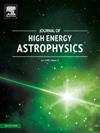Thermal instability of thin disk in the presence of wind and corona
IF 10.5
4区 物理与天体物理
Q1 ASTRONOMY & ASTROPHYSICS
引用次数: 0
Abstract
This study investigates the thermal stability of thin accretion disks in high-energy astrophysical systems, incorporating the effects of magnetic fields, winds, and coronae. We analyze how these factors influence disk stability, focusing on conditions under which magnetic fields enhance stability and on scenarios where winds and coronae can either stabilize or destabilize the disk. Our results reveal that increasing corona parameters raises disk thickness and reduces temperature, thereby affecting gas, radiation, and magnetic pressures. These interactions underscore the complex dependencies that shape accretion disk dynamics, offering insights into their structural and thermal behavior under varying physical conditions. The findings contribute to advancing theoretical models and numerical simulations of accretion processes in environments such as active galactic nuclei (AGN) and X-ray binaries, where disk stability plays a critical role in observed emissions and variability patterns.
在风和日冕存在下薄圆盘的热不稳定性
本研究探讨了高能天体物理系统中薄吸积盘的热稳定性,包括磁场、风和日冕的影响。我们分析了这些因素是如何影响磁盘稳定性的,重点是磁场增强稳定性的条件,以及风和日冕可以稳定或破坏磁盘的情况。我们的研究结果表明,日冕参数的增加增加了圆盘的厚度,降低了温度,从而影响了气体、辐射和磁压。这些相互作用强调了形成吸积盘动力学的复杂依赖关系,为在不同物理条件下的结构和热行为提供了见解。这些发现有助于在活动星系核(AGN)和x射线双星等环境中推进吸积过程的理论模型和数值模拟,在这些环境中,盘的稳定性在观测到的发射和变异性模式中起着关键作用。
本文章由计算机程序翻译,如有差异,请以英文原文为准。
求助全文
约1分钟内获得全文
求助全文
来源期刊

Journal of High Energy Astrophysics
Earth and Planetary Sciences-Space and Planetary Science
CiteScore
9.70
自引率
5.30%
发文量
38
审稿时长
65 days
期刊介绍:
The journal welcomes manuscripts on theoretical models, simulations, and observations of highly energetic astrophysical objects both in our Galaxy and beyond. Among those, black holes at all scales, neutron stars, pulsars and their nebula, binaries, novae and supernovae, their remnants, active galaxies, and clusters are just a few examples. The journal will consider research across the whole electromagnetic spectrum, as well as research using various messengers, such as gravitational waves or neutrinos. Effects of high-energy phenomena on cosmology and star-formation, results from dedicated surveys expanding the knowledge of extreme environments, and astrophysical implications of dark matter are also welcomed topics.
 求助内容:
求助内容: 应助结果提醒方式:
应助结果提醒方式:


